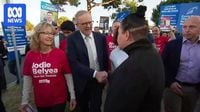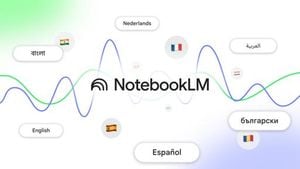As Australia heads to the polls for the federal election on May 3, 2025, the final public data poll from YouGov indicates that the Australian Labor Party is on track to retain government, leading the Coalition 52.2% to 47.8% on a two-party preferred basis. Conducted between April 24 and May 1, the poll surveyed 3,003 Australians and shows a marginal national swing of +0.07% to Labor since the 2022 election.
The Labor Party’s lead is bolstered by the unpopularity of Opposition Leader Peter Dutton, who has recorded a net satisfaction rating of -24%, the lowest for any major party leader this term, according to YouGov's public data polling series. This stark negativity contrasts with Prime Minister Anthony Albanese’s net satisfaction rating of -6% (43% satisfied, 49% dissatisfied).
Labor's primary vote has decreased slightly to 31.1% (down -2.4%), while the Coalition has seen a marginal gain of +0.4%, bringing their primary vote to 31.4%. Support for One Nation has dropped by -2%, now standing at 8.5%. In contrast, both the Greens and Independents have seen increases, rising to 14.6% (+0.6%) and 6.7% (+1.7%), respectively. Support for the Trumpets of Patriots has increased slightly, reaching 2.5%.
Albanese has extended his lead as preferred Prime Minister to 51%, compared to Dutton’s 34%—a record 17-point margin. Albanese leads across all demographics and geographies, including male and female voters, inner and outer metropolitan areas, as well as rural and regional Australia. "YouGov’s final call for the election points to a Labor majority government win, driven by the unpopularity of Peter Dutton," said Paul Smith, Director of Public Data at YouGov. "Albanese’s strong lead in the preferred Prime Minister metric, alongside stable two-party preferred figures, indicates that most Australians do not want Dutton as Prime Minister."
In the lead-up to the election, Albanese faced heckling from a woman claiming to be a nurse, who questioned the cut in subsidised psychologist sessions following the pandemic. This incident occurred during a visit to a pre-polling booth in Melbourne, where Albanese appeared to cut short his visit amid the confrontation.
Meanwhile, the Australian Electoral Commission (AEC) has asked the Labor Party to remove signs in the south-west Sydney seat of Fowler that read, "A vote for Dai Le is a vote for Dutton," as they may breach the Electoral Act. Dai Le, the incumbent independent member for the seat, criticized the Labor Party over the incident on social media, accusing it of dishonesty in its campaigning.
Early voting has broken records, with more than 6.77 million people casting a pre-poll vote this election, along with 1.64 million completed postal votes returned so far. Additionally, 155,000 people voted with a mobile team, bringing the total of those who have already cast their ballots to approximately 8.5 million—almost half the electoral roll.
With less than 24 hours to go until the polls close, discussions about who is winning the election have intensified. Recent polls indicate Labor's substantial edge over the Coalition, with the latest Newspoll giving the government a 5.2% two-party preferred lead (52.5% to 47.5%), while Roy Morgan places Labor's lead at six points (53% to 47%).
However, determining a definitive winner remains elusive until the ballots are counted. The reality is that elections aren't decided until the polls close, and both parties acknowledge a significant number of disengaged "soft" voters could swing either way. Furthermore, it is possible for a major party to win the national two-party preferred vote but still lose the election, as governments are formed by whoever wins the most seats, not merely the most votes.
Antony Green, a political analyst, indicated that for the Coalition to finish with more seats than Labor, they would need a swing of about 3.5%, and over 5% for majority government in their own right. He noted that with the rise of crossbenchers and independents, the political landscape has become increasingly complex.
Both Albanese and Dutton have embraced modern campaigning techniques, including podcast interviews, as part of their strategies. Adam Ferrier, a consumer psychologist, commented on this shift, stating, "We've moved from broadcast into all forms of more personal media that kind of wrap around the consumer, and podcasting is a massive part of that." This approach helps politicians appear more relatable and human, a crucial factor in an election that has been described as "the personal election."
As Australians prepare to vote, key issues such as housing costs, the economy, and energy transition remain at the forefront of discussions. The cost of living has surged in recent years, with inflation peaking at 7.8% in 2023 and housing prices in cities like Sydney reaching unaffordable levels. The Labor Party has promised to build 100,000 homes for first-time buyers, while the Coalition proposes investing in infrastructure and reducing red tape to expedite housing approvals.
Energy policy continues to divide the major parties, with the Coalition advocating for the construction of seven nuclear power plants by 2035, while Labor aims to transition to renewable energy sources, targeting 82% of the grid by 2030. This divergence reflects the growing calls from voters, particularly younger generations, for a more aggressive approach to clean energy.
As the election day approaches, the AEC reminds voters that polling stations will open from 8 am to 6 pm across the country. With 18 million eligible voters and compulsory voting laws in place, the stakes are high as Australians prepare to shape their government for the next three years. The counting of ballots will commence after the polls close, but full results may take longer to finalize.





